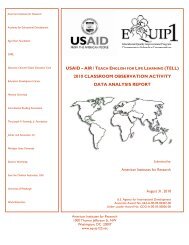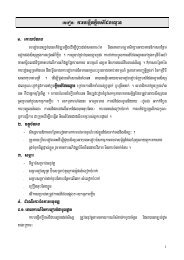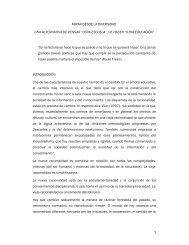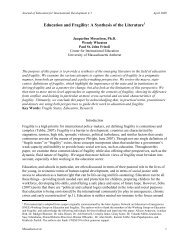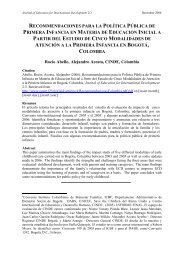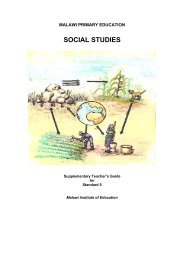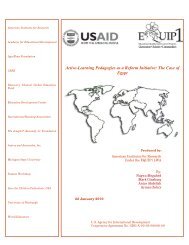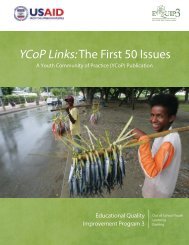The Power of Persistence: Education System ... - EQUIP123.net
The Power of Persistence: Education System ... - EQUIP123.net
The Power of Persistence: Education System ... - EQUIP123.net
Create successful ePaper yourself
Turn your PDF publications into a flip-book with our unique Google optimized e-Paper software.
Though President Mwanawasa made the fight<br />
against corruption a centerpiece <strong>of</strong> his presidency,<br />
the legacy <strong>of</strong> corruption from the regimes <strong>of</strong><br />
Kenneth Kaunda and Frederick Chiluba (later<br />
found by Britain’s High Court to have conspired<br />
to rob Zambia <strong>of</strong> about $46 million) heightened<br />
already conservative bureaucratic impulses guiding<br />
reform implementation. <strong>The</strong> decentralization <strong>of</strong><br />
payroll from MOE HQ to the provinces and the<br />
implementation <strong>of</strong> the school grant system required<br />
the Ministry bureaucracy to take significant risks<br />
that could expose it to charges <strong>of</strong> corruption<br />
and misuse <strong>of</strong> funding. During BESSIP, pressure<br />
from donor organizations and the GRZ to spend<br />
resources helped initiate the grant making process.<br />
Civil society and community engagement have<br />
successfully supported implicit decentralization<br />
through the community schools movement. This<br />
grassroots application <strong>of</strong> political will outside <strong>of</strong><br />
MOE channels is consistent with Zambia’s history<br />
<strong>of</strong> community support to schools, a response to<br />
providing education to the growing number <strong>of</strong><br />
OVCs, and evidence <strong>of</strong> wide frustration regarding<br />
the MOE’s limited provision <strong>of</strong> access to quality<br />
learning environments located close to communities.<br />
Under BESSIP we realized<br />
there are schools which<br />
cannot entirely be ignored.<br />
But it was a high risk. We<br />
didn’t know if the school<br />
would be surviving in the next<br />
term, didn’t know whether<br />
the grant would be used for<br />
the intended purpose. …Even<br />
when we started education<br />
boards and sent grants to<br />
them, we had stories where<br />
head teachers who bought<br />
bicycles [who] did not fully<br />
use the money for the<br />
intended purpose. [Why did<br />
we take the risk] for the<br />
simple fact it’s better to move<br />
one step and correct yourself<br />
if there are errors. I am happy<br />
that the Ministry took that<br />
bold decision. Otherwise we<br />
wouldn’t be where we are<br />
now in terms <strong>of</strong> financial<br />
transparency and financial<br />
accountability.<br />
—Senior Zambian Ministry <strong>of</strong><br />
<strong>Education</strong> Official<br />
Interaction across Dimensions<br />
In some ways, the SWAp mechanism and the promotion <strong>of</strong> decentralization to<br />
community schools had competing implementation strategies, which served<br />
to confuse the nature <strong>of</strong> MOE support for local participation. Decentralization<br />
and creation and support <strong>of</strong> community schools sought to create local venues<br />
encouraging local participation. <strong>The</strong> development <strong>of</strong> the SWAp however<br />
consumed significant time, energy, and resources at the central level. Sam<strong>of</strong>f<br />
notes, “In practice, SWAps become an obstacle to decentralization, accountability<br />
and local participation.” Some criticisms <strong>of</strong> FBE include that, while FBE support<br />
participation <strong>of</strong> the poorest students, it can lower full participation <strong>of</strong> parents<br />
and communities at the school level. Despite some <strong>of</strong> these challenges, changes<br />
in institutional framework, engagement <strong>of</strong> civil society, support <strong>of</strong> community<br />
schools, and establishment <strong>of</strong> DEBs will be difficult to reverse. <strong>The</strong>se changes<br />
have supported the increased inclusion <strong>of</strong> school and district stakeholders in<br />
SECTION 2: lESSONS fROM COUNTRY CASE STUdIES<br />
123



